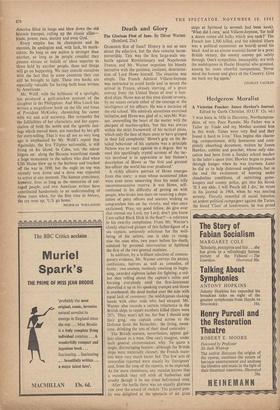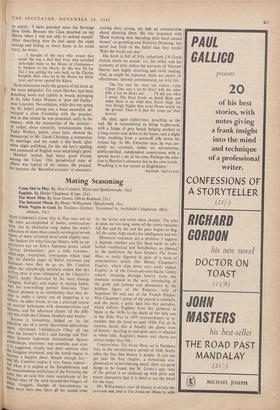Hedgerow Moralist
'1 wAs born in 1836 in Daventry, Northampton- shire, of very Poor Parents. My Father was a Tailor by Trade and my Mother assisted him in this work. Times were very Bad and they found it hard to Live.' Thus begins this charm- ing, compassionate, drily humorous and com- pletely absorbing document, written by James Hawker, cobbler and poacher, whose only edu- cation had been from a Sunday school teacher in the latter's spare time. Hawker began to poach through hunger when be was fourteen. Later he did so to help distressed neighbours, but in the end the excitement of hunting under clandestine conditions, of outwitting game- keepers and county police, got into his blood. 'If I am able, I will Poach till I die,' he wrote in his journal in 1904, when he was nearing seventy. Fiercely resentful of social injustice, an ardent political campaigner against the Tories, the hated 'Class' of landowners, he was proud to admit: 7 have poached more for Revenge than Gain. Because the Class poached on my liberty when I was not able to defend myself.' After describing how he had spent the night netting and killing as many hares as he could carry, he wrote: . I thought of the man who owned that wood. He was a Red Hot Tory who travelled sixty-eight miles to the House of Commons— to trespass on my liberty. So this was Tit for Tat. 1 was getting my own back on Sir Charles Knightly Bart, who sat in the House for thirty years and never opened his Kisser.
Such sentiments make the genesis of his book all the more delightful. For years Hawker had been poaching hares and rabbits in woods belonging to Sir John Tudor Walters at 'dear old Oadby,' near Leicester. Nevertheless, while this was going on, Sir John's young son, a keen naturalist, de- veloped a close friendship with the poacher, and in due course he was presented, early in the century, with the manuscript of the journal— or rather, more correctly, reminiscences. John Tudor Walters, junior, years later, showed the manuscript to Mr. Garth Christian, a connection by marriage, and the result is this book, after some slight polishing, for the old boy's spelling and command of English were surprisingly good.
Hawker, indeed, had many good friends among the 'Class.' This paradoxical state of affairs was typical of his nature. He praised, for instance, the 'Beautiful example' of pheasants rearing their young, yet had no compunction about shooting them. He was impatient with `Hard working men Spending their hard earned money' on gambling and 'Exsesive Drinking,' but never lost faith in the belief that they would 'Rule the world one day.'
His book is full of little aphorisms (`A Good Article needs no praise,' i.e., his wife), and his economy of style makes the accounts of 'Narrow' Shaves' into highly diverting and vivid reading. And, as might be expected, there are plenty of affectionate, shrewd commentaries on wild life : The fox and the stoat are curious Little Chaps. One eats, a lot he Don't kill, the other kills a Lot he Don't eat. . . . I'll tell you what I mean. The Stoat Feeds on Small Birds and when there is no wind they Roost High. On very Rough Nights they roost Down nearly on the ground. Then it is that the stoats get their harvest.
He died, aged eighty-four, poaching to the end. He is remembered as being bright-eyed, with a fringe of grey beard, bulging pockets in a long covert coat down to his knees, and a slight limp, resulting from a sawn-off rifle down his trouser leg. As Mr. Christian says, he was cer- tainly no criminal; rather an adventurous, public-spirited, independent countryman with a special moral cade of his own. Perhaps the solu- tion to Hawker's character lies in his own words : 'Poaching is in our nature as Englishmen.'
RALEIGH TREVELYAN











































 Previous page
Previous page